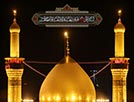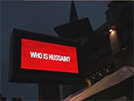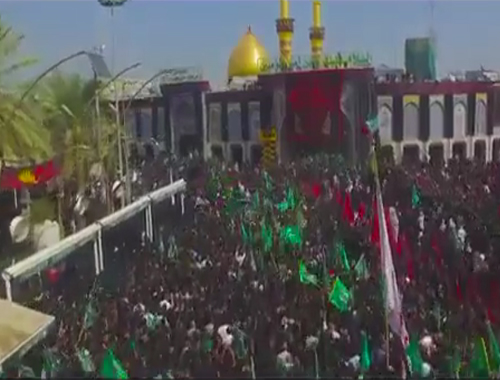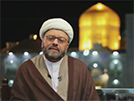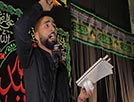Letter 20
- Details
- Hits: 2825
Letter 20
I A General Reference to the Texts,
II A Reference to the House on the Day of Warning,
III Sunni Reporters of this Hadith.
Thul-Hijjah 9, 1239
1) Anyone who is acquainted with the biography of the holy Prophet (pbuh), especially researching his conduct while laying the foundations of the Islamic State and its legislative system, the establishment of its bases, the issuing of its codes and the organizing of its affairs on behalf of the Almighty Allah..., will find `Ali (as) the vizier of the Messenger of Allah (pbuh), his supporter against his foes, the custodian of his knowledge, the heir of his government, his vicegerent, and the one in charge after him. Whoever studies the statements and actions of the Prophet (pbuh), while at home or on a journey, will find his statements, peace and blessings of Allah Almighty be upon him and his progeny, sequential in this regard from the beginning of his Call till his demise.
2) Refer to such statements at the dawn of the Call, before Islam was preached in Mecca publicly, when the Almighty revealed unto him the verse "And warn thy nearest tribe (Qur'an, 26:214)." He invited them to the house of his uncle Abu Talib. They were forty men, more or less. Among them were his uncles Abu Talib, al-Hamzah, al-`Abbas, and Abu Lahab. The hadith in this regard is sequentially reported by Sunnis. At the conclusion of his statement to them, the Messenger of Allah, peace be upon him and his progeny, said:
"O descendants of `Abdul-Muttlib! I swear by God that I know no youth among the Arabs who has brought his people something better than what I have brought you. I have brought you the best of this life and the life to come, and God has commanded me to call you towards Him. Therefore, who among you shall support me in this matter and be my brother, the executor of my will, and my successor?"
All the listeners, with the exception of `Ali, who was the youngest among them, kept silent. `Ali responded by saying: "I, O Messenger of Allah, am willing to be your vizier in this matter." The Messenger of Allah (pbuh) then took `Ali by the neck and said: "This is my brother, executor of my will and vizier; therefore, listen to him and obey him." Those present laughed and kept saying to Abu Talib: "Allah has commanded you to listen to your son, and to obey him!"
3) Many of those who have learned the prophetic legacy by heart have reported the hadith above verbatim as such. Among them are: Ibn Ishaq, Ibn Jarir, Ibn Abu Hatim, Ibn Mardawayh, Abu Na`im, al-Bayhaqi in his book Al-Dala'il, both al-Tha`labi and al-Tabari in their exegeses of Surat al Shu`ara' in their book Al-Tafsir al-Kabir, in Vol. 2 of al-Tabari's Tarikh al-Umam wal Muluk. Ibn al-Athir has reported it as an undisputed fact in Vol. 2 of his Al-Kamil when he mentioned how the Almighty commanded His Messenger to declare his call to the public, Abul-Fida in Vol. of his Tarikh while discussing who was the first to embrace Islam, Imam Abu Ja`fer al-Iskafi al-Mu`tazili in his book Naqd al-Uthmaniyyah declaring its accuracy,[1] al-Halabi in his chapter on the Prophet's hideout at the house of Arqam in his well-known Sirah.[2]
In this same context, with almost identical wording, has this hadith been reported by many masters of hadith and most reliable Sunni authorities such as al-Tahawi, Diya' al-Maqdisi in his Mukhtara, and Sa`id ibn Mansur in his Sunan. Refer to what Ibn Hanbal has recorded of `Ali's hadith on pages 111 and 159 of Vol. 1 of his Musnad. He also pointed out at the beginning of page 331 of Vol. 1 of his Musnad, to a very significant hadith from Ibn `Abbas] containing ten characteristics in which `Ali has distinguished himself from everyone else. That hadith is published in Nisa'i, too, from Ibn `Abbas, on page 6 of his Khasa'is al `Alawiyyah, and on page 132, Vol. 3, of Hakim's Mustadrak. Al-Thahbi has narrated it in his Talkhis], vouching for its authenticity. Refer to Vol. 6 of Kanz al-`Ummal which contains all the details.[3] Refer also to Muntakhabul Kanz which is cited in the footnote of Imam Ahmed's Musnad; refer to the footnote on pages 41 and 43 of Vol. 5 of the book to find all details. This, we believe, suffices to serve as glorious proof, and peace be with you.
Sincerely,
Sh
-----------------------------------
[1] As on page 263, Vol. 3, of Sharh Nahjul Balaghah by Ibn Abul Hadid, Egyptian edition. As regarding his book Naqd al-`Uthmaniyya, it is a unique book worthy of the attention of any seeker of the truth. It is on page 257 and its succeeding pages up to page 281, Vol. 3, of the Sharh, at the end the commentary at the conclusion of the "qasi`a" sermon.
[2] Refer to the fourth page of that chapter, or to page 381 of the first volume of Al-Sira al-Halabiyya. Ibn Taymiyyah's wrecklessness is unfair, and his judgment is due to his well-known fanaticism. This hadith is quoted by the Egyptian sociologist Muhammad Hasanayn Haykal; refer to the second column on page five of the supplement to issue 2751 of his newspaper Al-Siyasa dated Thul-Qi`da 12, 1350, and you will find it there explained in detail. If you refer to the fourth column on page six of the supplement to issue 2785 of the same newspaper, you will find the author quoting this hadith from Muslim's , Ahmed's musnad, `Abdullah ibn Ahmed's Ziyadat al-Musnad, Ibn Hajar al-Haithami's Jami`ul Fara'id, Ibn Qutaybah's `Uyun al-Akhbar, Ahmed ibn `Abd Rabbih's Al-`Iqd al-Farid, `Amr ibn Bahr al-Jahiz in his dissertation on the descendants of Hashim, and Imam Abu Ishaq al-Tha`labi's Tafsir. This hadith is also quoted by the British author Georges in his well-known book A Treatise on Islam, translated into the Arabic by an atheist from a Protestant descent calling himself Hashim al-`Arabi. You can also find this hadith on page 79 of the treatise's Arabic version, 6th edition. Due to the fame this hadith enjoys, a few non-Arab writers have included it in their books, especially in French, English and German. In his book Heroes and Hero Worship, Thomas Carlyle quotes it briefly.
[3] Refer to hadith 6008 on page 392, and you will find it quoted from Ibn Jarir, while hadith 1045 on page 396 is quoted from Ahmed's Musnad and from al-Dia al-Maqdisi's Al-Mukhtara, and from al-Tahawi. Ibn Jarir has verified it. Also refer to hadith 6056 on page 397 and you will find it quoted from Ibn Ishaq, Ibn Jarir, Ibn Abu Hatim, Ibn Mardawayh, Abu Na`im, al-Bayhaqi on the branches of faith, and in the Dala'il, and hadith 6102 on page 401 and you will find it quoted from Ibn Mardawayh, and hadith 6155 on page 408 and you will find it quoted from Ahmed's Musnad and from Ibn Jarir from Al-Diya fil Mukhtara. Whoever researches Kanz al-`Ummal will find this hadith in various places throughout the book. If you look into page 255, Vol. 3, of Sharh Nahjul Balaghah by the Mu`tazilite Imam Ibn Abul-Hadid, or at the end of the explanation of the "qasi`a sermon" in it, you will find this hadith in its entirety.


